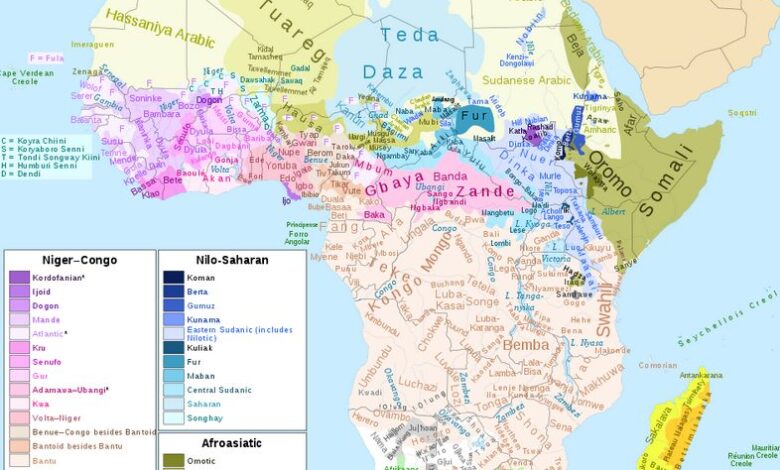Countries with the Highest Number of Languages in Africa

Africa, a continent rich in culture and history, is also home to an astonishing array of languages. With over one-third of the world’s 6,000 languages, Africa showcases more than 2,000 linguistic variations.
This diversity caters to a population surpassing 1.2 billion, highlighting the continent’s unique position in global linguistic heritage.
The Rich Tapestry of African Languages
A Multitude of Voices
On the African continent, at least 75 languages have more than one million speakers. The remaining languages are spoken by populations ranging from a few hundred to several hundred thousand.
This linguistic variety is not just a numerical feature but a living narrative that tells the stories of numerous cultures, traditions, and histories.
Prominent African Languages
Among the many languages, Swahili, Hausa, and Yoruba stand out. Swahili is widely spoken in the southern and eastern parts of Africa.
Hausa is the primary language for the Chadic people in Nigeria, Niger, and Chad, while Yoruba is spoken in southwest Nigeria, Benin Republic, and Togo.
Each of these languages is spoken by over 150 million people, reflecting their significant influence and reach.
Influence of Colonial Languages
Non-indigenous languages like English and French are also prevalent across Africa, primarily due to historical colonial influences.
English, for instance, is spoken by about 130 million Africans and is an official or secondary language in 27 out of 54 countries. French similarly holds a prominent place in many African nations.
Also Read: The Reasons Why Swahili Is Seen As Africa’s Most Spoken Language
Top 10 African Countries with the Most Languages
According to Statista, the following African countries boast the highest number of languages:
1. Nigeria – 520 Languages
Nigeria leads the continent with a staggering 520 languages. This linguistic diversity mirrors the country’s cultural richness and regional variations.
2. Cameroon – 227 Languages
Cameroon is home to 227 languages, showcasing its multicultural society and complex ethnic composition.
3. Democratic Republic of the Congo – 214 Languages
The Democratic Republic of the Congo (DRC) hosts 214 languages, reflecting its vast and diverse population.
4. Chad – 129 Languages
With 129 languages, Chad highlights the linguistic diversity found in the central regions of Africa.
5. Tanzania – 128 Languages
Tanzania’s 128 languages underscore its rich cultural heritage and historical trade connections.
6. Ethiopia – 92 Languages
Ethiopia, with 92 languages, showcases its ancient civilization’s linguistic diversity.
7. Côte d’Ivoire – 88 Languages
Côte d’Ivoire’s 88 languages reflect its varied ethnic groups and cultural influences.
8. Ghana – 83 Languages
Ghana is home to 83 languages, highlighting its vibrant cultural landscape.
9. Sudan – 75 Languages
Sudan, with 75 languages, showcases the diversity of its population and historical regions.
10. South Sudan – 73 Languages
South Sudan rounds out the list with 73 languages, reflecting its recent history and cultural mosaic.
Also Read: French Speaking Countries in Africa
The Beauty of Africa’s Linguistic Landscape
Cultural Significance
Africa’s linguistic diversity is a testament to the continent’s cultural wealth. Each language represents unique traditions, beliefs, and histories. This variety fosters a rich cultural exchange and understanding among different ethnic groups.
Challenges and Opportunities
While linguistic diversity is a strength, it also presents challenges, particularly in education and governance. Multilingualism can complicate communication and policy implementation.
However, it also offers opportunities for inclusive and culturally sensitive approaches to governance and education.
Preserving Linguistic Heritage
Efforts to preserve and promote African languages are crucial. Linguists, educators, and policymakers are working to document and revitalize endangered languages, ensuring that this rich linguistic heritage is passed on to future generations.
Conclusion
Africa’s linguistic diversity is one of its greatest assets, reflecting the continent’s rich cultural and historical tapestry.
From Nigeria’s 520 languages to South Sudan’s 73, each language contributes to the vibrant mosaic of African identity.
By valuing and preserving this diversity, Africa can continue to celebrate its unique cultural heritage and foster greater unity among its peoples.





